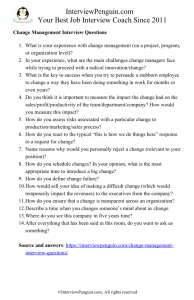You may deal with these questions in two cases:
- When you directly apply for jobs in change management (change specialist, business transition manager, change manager, etc).
- When you apply for a job in a company that experiences constant change (e.g. an IT business which grows rapidly on the go and nobody exactly knows what they will do in two months), and they are hiring only people who can easily adapt to an ongoing change.
In both situations you should demonstrate your proactive approach to work and challenges, your leadership and teamwork abilities, and willingness to constantly learn and improve your skills in all areas.
In this article we will look at some questions that are designed to uncover your ability to handle (or even induce) changes in the company, and how you should answer them. Enjoy!
Table of Contents
What is your experience with change management (on a project, program, or organization level)?
Try to talk about particular situations from your past jobs when you encouraged change, managed it, or simply joined the flow.
You do not necessarily have to use technical terminology and theory of change management, but if you want to, have a look at this article, and this one, after ending reading our post. It will help you to understand the methodology.
Try to talk with enthusiasm (or even excitement) about your involvement in the process, and do not forget to stress the vital role change management plays in today’s economy. Either we adapt, or we will be out of business soon.
In your experience, what are the main challenges change managers face while trying to proceed with a radical innovation/change?
First and foremost you should refer to human factor. Most people are reluctant to change, and you will always experience some opposition on their side.
How a company (and the managers) deal with this opposition depend mostly on the relationship they have with the employees (on all levels of management), and on their ability to introduce and communicate the changes in an appropriate way.
But you can talk also about various problems that may occur while implementing changes–unexpected variables, inability of some people to adapt to the changes, need to recruit new people (who are not available on the market), management and leadership failures, etc.
What is the key to success when you try to persuade a stubborn employee to change a way they have been doing something in work for months or even years?
In real situations this depends mostly on the relationship you have with the employee. If they trust you and respect you as a a manager, they will simply apply the changes, and listen to you. But if they do not like you and you lack respect, things will become more difficult…
Nevertheless, in an interview you should say that the key is to explain the employee how they will benefit from the changes. Either immediately, or in a long run. It can make their work easier, more effective, they can earn more money, they can learn something new in the process, etc.
At the end of the day everyone minds their own business. The best way to convince someone to change the way they do their job is to show them how they will benefit from the change. Keep it on your mind while answering this question in an interview.
* May also interest you: Tell me about a time when you had to make a major change to your daily routine.
Do you think it is important to measure the impact the change had on the sales/profit/productivity of the team/department/company? How would you measure this impact?
It is not important. It is essential. Unless you can clearly measure the impact of the change, it makes no sense to introduce it.
Tell the hiring managers that you will always specify clear indicators and metrics, and measure them before introducing the change, during the process, and after it.
However, you should also say that it takes time until employees learn to do things right, and we should not get discouraged by the drop in numbers right after introduction of a rather radical change.
Obviously the way you will measure the impact depends on the type of modification (can be number of sales, phone calls made per day, can be number of customer complaints, anything), and you should adjust your answer to it (they may specify the change in their question).
How do you assess risks associated with a particular change to production/marketing/sales process?
Every change is somehow risky, and the hiring managers are aware of it. You can say that you use mathematical models and time row analysis to forecast the impact of the change, and the risks involved (decrease of revenue, problems with operational cash flow, resignation of some employees and inability to replace them, etc).
You can also say that you try to look at examples from real business practice (either past changes or changes your competitors made), to assess the risks involved.
Last but not least, you should say that you will do all precautions, and consult key employees (who will be affected), to minimize the risks involved with the change.
Special Tip: Download the full list of questions in a one page long PDF, print it and practice your interview answers anytime later:

How do you react to the typical “this is how we do things here” response to a request for change?
You should show some empathy in your answer. In a current situation on the employment market, many employees are virtually irreplaceable, and it is crucial to retain them in the company.
Say that you understand why they say it, especially if things go well, or if they do not see the bigger picture. You can say that you will try to explain them (in a simple way, one they should understand) how the change impacts the company, and also how it will (at least eventually) benefit them in their job.
Of course this may not always work in real life situations, but job interview is mostly about your opinions and attitudes, and you should show the right attitude with your answer.
Some other change management questions you may get
- Name reasons why would you personally reject a change (relevant to your position)?
- Give an example of an occasion when you used logic to solve a problem.
- How do you schedule changes? In your opinion, what is the most appropriate time to introduce a big change?
- How do you define change failure?
- Tell us about a time when you had to make a decision without all information you needed to make a qualified decision.
- How would sell your idea of making a difficult change (which would temporarily impact the revenues) to the executives from the company?
- Tell us about a time when you showed initiative at work.
- How do you ensure that a change is transparent across an organization?
- Describe a time when you changes someone’s mind about a change.
- Describe a time when you struggled to communicate something (for example an idea for a change) to one of your colleagues. What did you do to get your message over?
- Tell us about a situation when you had to meet a tight deadline in work (for example when introducing a change).
Special tip: The behavioral questions (tell me about a time when, describe a situation when) are the Achilles’ heel of many skilled managers, while they try to succeed in a job interview. If you also find these questions difficult, have a look at our Interview Success Package. Up to 7 premium answers to 31 most common scenario-based questions (+ more) will help you get ready for every question, outclass your competitors, and walk away with a coveted employment agreement. Thank you for checking it out!
Conclusion, next steps
In today’s fast paced economy, when technology evolves faster than ever, an ability to adapt to change, or even to induce it, is considered crucial by many hiring managers.
Prepare for the questions from this article, show the interviewers that you understand the importance of innovation, the risks involved with every change, and know how to motivate the others to accept changes (or at least to give them a try).
Success or failure in the interview is not a question of luck. Prepare for the questions you may face, do more than the other job seekers, and the result will come. I wish you good luck!
Matthew
May also interest you:
- Teamwork interview questions – You won’t be a stand alone unit in the company, and hiring managers will likely ask you a few questions that test your teamwork abilities. Learn how to answer them.
- Relationship management interview questions.
- Cultural fit interview questions.
- Operations manager interview questions.


